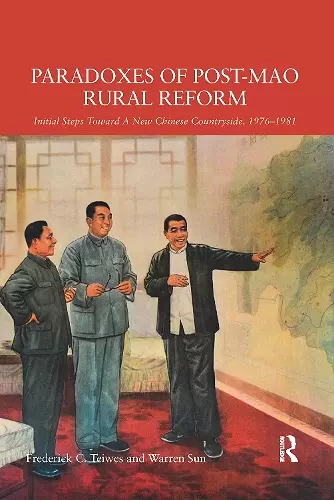Paradoxes of Post-Mao Rural Reform
Initial Steps toward a New Chinese Countryside, 1976-1981
Warren Sun author Frederick C Teiwes author
Format:Paperback
Publisher:Taylor & Francis Ltd
Published:30th Jun '20
Currently unavailable, and unfortunately no date known when it will be back
This paperback is available in another edition too:
- Hardback£160.00(9781138856585)

The decollectivization of Chinese agriculture in the early post-Mao period is widely recognized as a critical part of the overall reform program. But the political process leading to this outcome is poorly understood. A number of approaches have dominated the existing literature: 1) a power/policy struggle between Hua Guofeng’s alleged neo-Maoists and Deng Xiaoping’s reform coalition; 2) the power of the peasants; and 3) the leading role of provincial reformers. The first has no validity, while second and third must be viewed through more complex lenses.
This study provides a new interpretation challenging conventional wisdom. Its key finding is that a game changer emerged in spring 1980 at the time Deng replaced Hua as CCP leader, but the significant change in policy was not a product of any clash between these two leaders. Instead, Deng endorsed Zhao Ziyang’s policy initiative that shifted emphasis away from Hua’s pro-peasant policy of increased resources to the countryside, to a pro-state policy that reduced the rural burden on national coffers. To replace the financial resources, policy measures including household farming were implemented with considerable provincial variations. The major unexpected production increases in 1982 confirmed the arrival of decollectivization as the template on the ground. The dynamics of this policy change has never been adequately explained.
Paradoxes of Post-Mao Rural Reform offers a deep empirical study of critical developments involving politics from the highest levels in Beijing to China’s villages, and in the process challenges many broader accepted interpretations of the politics of reform. It is essential reading for students and scholars of contemporary Chinese political history.
"Teiwes (Univ. of Sydney, Australia) and Sun (Monash Univ., Australia) set out dispelling some misunderstandings about China’s rural reform in the early post-Mao period (1976–81). For the first two years after Mao’s death, Hua Guofeng was the dominant figure in rural policy, steadily moving in a pro-peasant direction. By early 1980, when the political power transition was complete, Deng Xiaoping was as committed to collective agriculture as Hua. Meanwhile, provincial leaders such as Zhao Ziyang and Wan Li were experimenting with de-collectivization policies, namely baochan daohu (contracting production to households). The household responsibility system proved successful as agricultural production increased in the early 1980s. Deng gradually endorsed Zhao’s policy initiative and shifted from Hua’s pro-peasant policy of increased resources to the countryside to a pro-state policy that reduced rural burden on national coffers, leaving production at the household level. With the empirical study of major developments involving politics from the highest level in Beijing to rural villages, the book captures the dynamics of rural reform in the early post-Mao era. This is a highly informative account of Chinese politics and major decision making as Deng emerged as the supreme leader after Mao."
Z. Zhu, Bucknell University, CHOICE
"One of the core features of Teiwes and Sun’s work over the last decades has been to question the story of the demise of Hua Guofeng, and the ineffectiveness of his brief tenure of ultimate power in the People’s Republic. Hua was Mao’s final chosen successor, and had emerged largely from provincial leadership before catching Mao’s eye in his final years. The authors make clear that his relative youth and lack of revolutionary experience compared to Deng meant that his hold on power after the radical Gang of Four were removed from power was always under question."
Kerry Brown,
ISBN: 9780367597351
Dimensions: unknown
Weight: 453g
350 pages